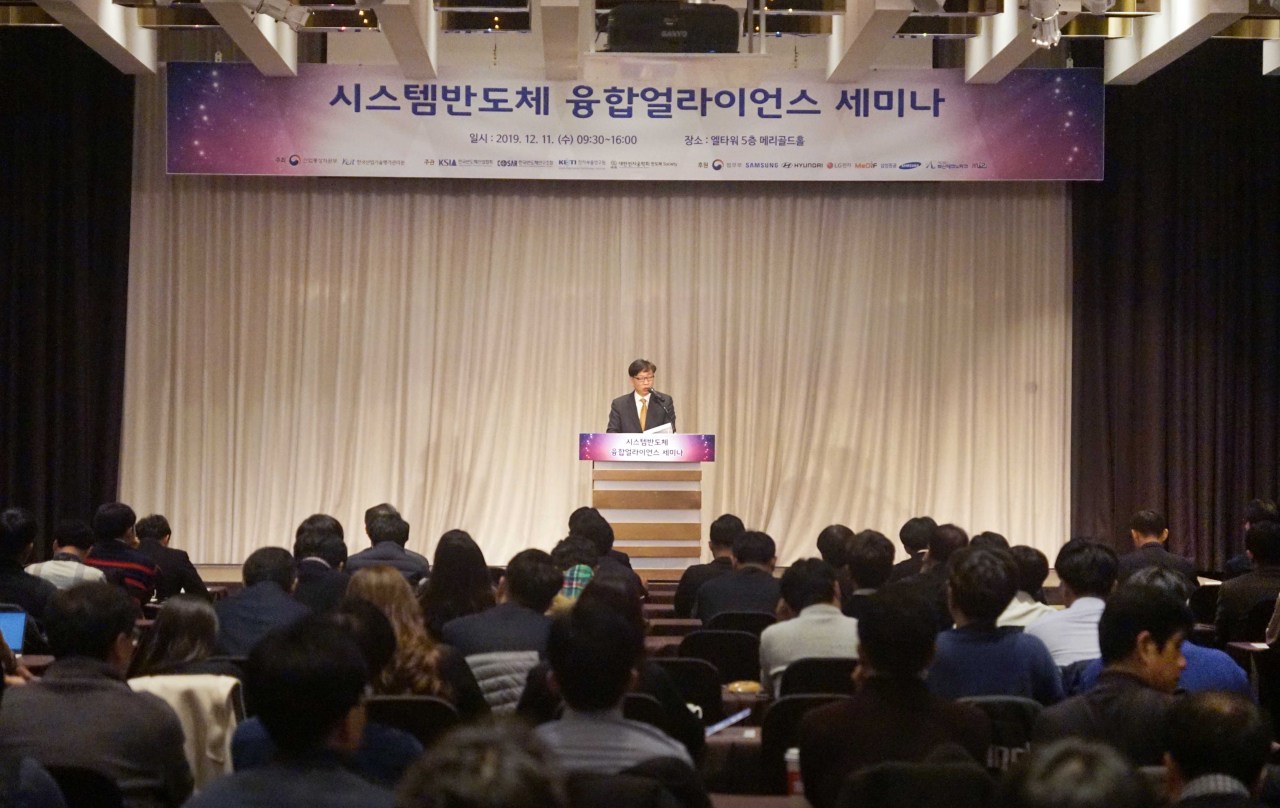Strategic approaches on system chip discussed at private-public forum
Samsung, LG, Hyundai Motor share future plans, achievements in non-memory chip development
By Song Su-hyunPublished : Dec. 11, 2019 - 17:08
Taking a step further into the non-memory market, officials from South Korea’s industry-leading companies gathered on Wednesday to discuss their approaches to the government-led initiative to boost the system-on-chip industry.
Hosted by the Ministry of Trade, Industry and Energy, the seminar was held to promote cooperation among semiconductor manufacturers, fabless firms and customers from different industries on development of new SoC products and solutions as a follow-up measure of the national vision for system chips announced on April 30.
While public officials from the Ministry of Justice, Korea Evaluation Institute of Industrial Technology and Korea Electronics Technology Institute discussed measures to create new demand for system chips, company officials from LG Electronics and Hyundai Motor Company addressed what kinds of SoCs and solutions are needed for their products and services.
Hosted by the Ministry of Trade, Industry and Energy, the seminar was held to promote cooperation among semiconductor manufacturers, fabless firms and customers from different industries on development of new SoC products and solutions as a follow-up measure of the national vision for system chips announced on April 30.
While public officials from the Ministry of Justice, Korea Evaluation Institute of Industrial Technology and Korea Electronics Technology Institute discussed measures to create new demand for system chips, company officials from LG Electronics and Hyundai Motor Company addressed what kinds of SoCs and solutions are needed for their products and services.

Samsung Electronics took part in the forum on behalf of the foundry industry.
Song Yong-ha, senior marketing manager at Samsung Foundry, explained the company’s efforts to provide customers with high-tech manufacturing infrastructure tailored to the different needs of individual customers according to areas of applications such as internet of things, artificial intelligence and automotive.
Samsung, the world’s second-largest foundry company, is seeking to ramp up production by facilitating local fabless firms in terms of designing and manufacturing innovative logic chips.
LG Electronics highlighted that sensors are the most crucial SoCs embedded in various electronic and mobile products.
“For the electronics industry, sensor solutions involve key SoCs for the future,” said Kim Seong-hyok, head of sensor solution development at the tech giant.
Over 50 kinds of physical and virtual sensors are used to make the latest smartphone models, and the evolution of sensor solutions is ongoing as users want more and more personalized, interactive and intuitive devices.
“Between phone vendors or home appliance manufacturers and sensor developers, there is a high need to discuss co-development of system-level sensor solutions that enable sensor modules to well be assembled into hardware to function properly,” Kim said.
Hyundai Motor is seeking to develop new electric and electronic architectures for future eco-friendly vehicles, said Seo Jeong-do, head of platform controller development at the automaker.
“In response to changes in the automobile industry toward mobility, electrification, connectivity and autonomous driving, the company is making internal efforts to develop automotive chips as well as needed software,” Seo said.
Hyundai Motor has been partnering with Germany-based SoC chipmaker Infineon to develop automotive chips since 2007. It is also developing software platform Adaptive AUTOSAR for connected and autonomous driving, the official said.
By Song Su-hyun (song@heraldcorp.com)






![[From the Scene] Monks, Buddhists hail return of remains of Buddhas](http://res.heraldm.com/phpwas/restmb_idxmake.php?idx=644&simg=/content/image/2024/04/19/20240419050617_0.jpg&u=20240419175937)







![[From the Scene] Monks, Buddhists hail return of remains of Buddhas](http://res.heraldm.com/phpwas/restmb_idxmake.php?idx=652&simg=/content/image/2024/04/19/20240419050617_0.jpg&u=20240419175937)

![[KH Explains] Hyundai's full hybrid edge to pay off amid slow transition to pure EVs](http://res.heraldm.com/phpwas/restmb_idxmake.php?idx=652&simg=/content/image/2024/04/18/20240418050645_0.jpg&u=20240419100350)

![[Today’s K-pop] Illit drops debut single remix](http://res.heraldm.com/phpwas/restmb_idxmake.php?idx=642&simg=/content/image/2024/04/19/20240419050612_0.jpg&u=)